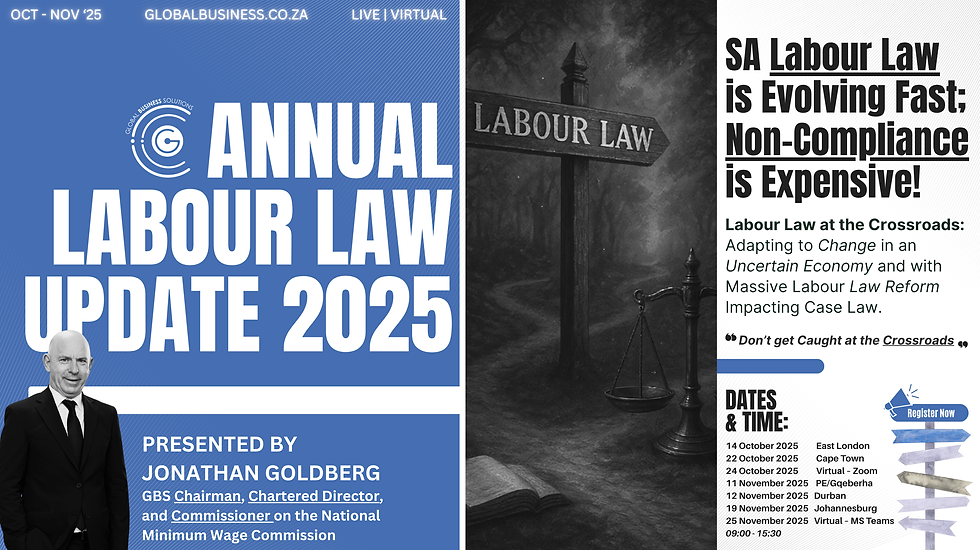Employment Law Alert: Key Lessons from the Constitutional Court's Mavundla v Gotcha Security Judgment
- Grant Wilkinson

- Jul 30, 2025
- 3 min read
Updated: Aug 18, 2025

The Constitutional Court's recent decision in Mavundla v Gotcha Security Services (Pty) Ltd [2025] ZACC 11 serves as a crucial reminder for employers about the proper implementation of reinstatement orders and the financial consequences of non-compliance.
Case Summary
Mr Mavundla, a VIP protection officer, was dismissed in March 2019. The CCMA ordered his reinstatement with effect from 1 August 2019, along with payment of R52,200 for the period from dismissal to reinstatement. However, when he reported for duty on 1 August 2019, Gotcha Security refused to accept his services, citing a pending review application (which was never pursued).
Later, in September 2020, the company invited him back but imposed additional conditions requiring a firearm competency certificate and industry registration. When Mr Mavundla disputed these conditions, contempt proceedings followed, resulting in a Labour Court order in May 2021 compelling unconditional reinstatement from 1 June 2021.
The dispute centered on whether Mr Mavundla was entitled to arrear salary for the period between the original reinstatement date (1 August 2019) and his actual return to work (1 June 2021).
The Constitutional Court's Decision
The Constitutional Court unanimously ruled in favour of Mr Mavundla, ordering Gotcha Security to pay his full remuneration for the period 1 August 2019 to 31 May 2021. The Court clarified several important principles:
Reinstatement Orders Must Be Implemented Without Delay
Once a reinstatement order is made, employers cannot unilaterally impose additional conditions
Delaying implementation while considering review applications does not excuse non-compliance
Enforcement Orders Don't Replace Original Orders
A subsequent court order compelling compliance doesn't "reset" the original reinstatement date
Employees retain their right to arrear remuneration from the original reinstatement date
No Presumed Waiver of Rights
Accepting a new reinstatement date doesn't automatically constitute abandonment of claims for arrear remuneration
Courts cannot find a compromise or waiver without proper pleadings and evidence
Key Lessons for Employers
Comply Immediately with Reinstatement Orders
Don't delay implementation while considering appeals or reviews. The financial consequences compound daily through ongoing salary obligations.
Avoid Imposing New Conditions
You cannot add requirements that weren't part of the original employment contract or reinstatement order. Such conditions may constitute a refusal to reinstate.
Calculate the True Cost of Non-Compliance
Beyond the original compensation ordered, employers face potential liability for:
Full salary for the delayed period
Legal costs for enforcement proceedings
Reputational damage
Document Everything Properly
If you believe there are legitimate grounds for conditioning reinstatement, seek proper legal advice and ensure any agreements are properly recorded.
Consider Settlement Early
Given the mounting financial exposure, early settlement discussions may be more cost-effective than prolonged litigation.
Practical Recommendations
For HR Professionals:
Develop clear protocols for implementing CCMA/Labour Court orders
Train managers on the consequences of non-compliance
Establish escalation procedures for disputed reinstatements
For Legal Teams:
Advise clients on immediate compliance obligations
Calculate potential financial exposure accurately
Consider review applications carefully - they don't suspend compliance obligations
For Employers:
Budget for potential reinstatement costs in dismissal decisions
Ensure employment contracts clearly specify job requirements
Maintain proper records of all employment conditions
The Bottom Line
This case demonstrates that employment law compliance isn't optional - it's a business imperative. The Constitutional Court has sent a clear message: employers who fail to properly implement reinstatement orders will face significant financial consequences.
The cost of compliance is almost always less than the cost of non-compliance, especially when legal fees, prolonged uncertainty, and reputational damage are factored in.
This article is for general information purposes and should not be construed as legal advice. Employers facing reinstatement orders should seek specific legal counsel.
What are your thoughts on this judgment? Have you encountered similar challenges in implementing CCMA or Labour Court orders?
Join us at the Annual Labour Law Update. This year's theme is Labour Law at the Crossroads: Adapting to Change in an Uncertain Economy and with Massive Labour Law Reform Impacting Case Law. What you'll gain:
Master the Digital Transformation of Labour Law in 2025
200+ Labour Law Cases Unpacked by Jonathan Goldberg
Critical Updates on Upcoming Legislation & NEDLAC Amendments
Navigate Workplace Challenges from the Digital Era to Discrimination Laws

View our upcoming events: Upcoming Events, like EFFECTIVE ARBITRATION: Practical Tools for Labour Disputes, or Effective Strike Management.
*All workshops are offered as customised in-house training that can be presented virtually or on-site.
"Global Business Solutions (GBS) - Your Partner in Strategic HR Compliance"










Comments